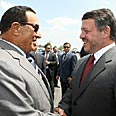
Jordan and Egypt urged the Palestinians on Wednesday to cast aside their differences to make way for peace and statehood.
The joint call by Jordan's King Abdullah II and Egyptian President Hosni Mubarak came in a closed-door meeting in the Jordanian capital and hours after IDF forces killed at least eight Palestinians in an air strike and a ground operation in Gaza Strip.
Four of the dead in Gaza were identified as members of a terror group involved in kidnapping a BBC journalist and capturing an Israeli soldier. Twenty-five Palestinians were wounded, Palestinian hospital officials said.
Israel said it was responding to ongoing rocket and mortar fire from Gaza at Israeli border towns, including 20 mortar rounds and a dozen rockets on Wednesday. In the air strike, Israeli aircraft fired missiles at a jeep the army said carried rockets ready to fire. In the ground incursion, tanks took control of the northern Gaza town of Beit Hanoun, from where militants had launched rockets.
In Jordan, Abdullah and Mubarak - both key US allies whose countries have signed peace treaties with Israel - implicitly referred to the power struggle between bitter enemies, the moderate Fatah and the militant Hamas. Both factions have been at loggerheads since heavily armed Hamas militiamen seized Gaza in mid-June after thrashing pro-Fatah security forces.
Abdullah and Mubarak said in a joint statement that they urged the Palestinians to "Adopt unified stances that would conform with the current challenges and enable them to establish their independent state and restore their national legitimate rights."
The statement said the two leaders also reiterated that a US-sponsored international peace conference, slated to be held in the United States in November, was an "important opportunity for achieving tangible results" in Palestinian-Israeli peacemaking.
But they both repeated their call for "adequate preparations" to precede the meeting, which they said must tackle crucial issues that have tormented Mideast negotiators, such as the status of refugees, East Jerusalem and the borders of a future Palestinian state.
US President George W. Bush in July called for the conference to break a deadlock in the Mideast peace
process, but the lack of an official agenda, location and exact timing for the meeting has been a cause for concern in the region.















